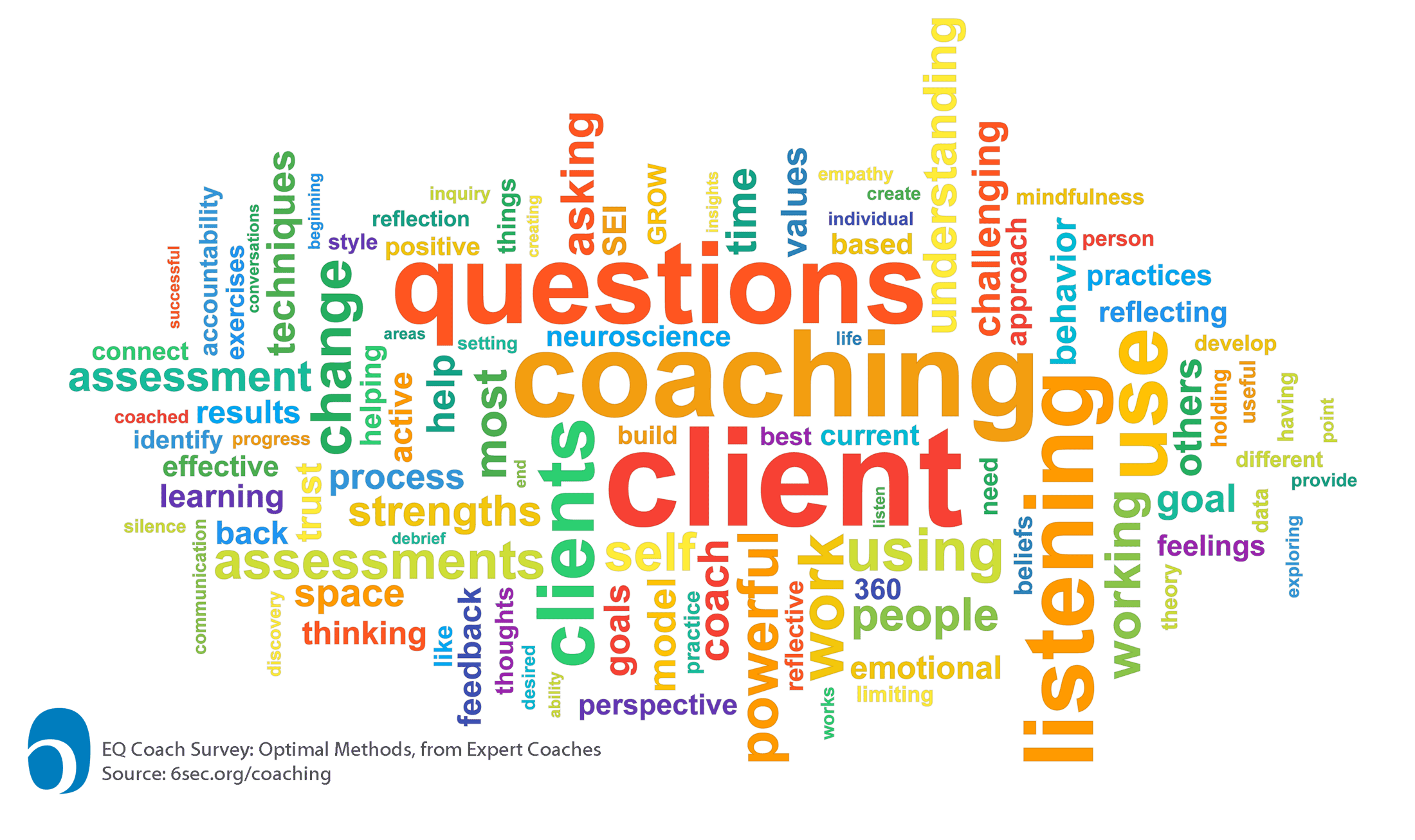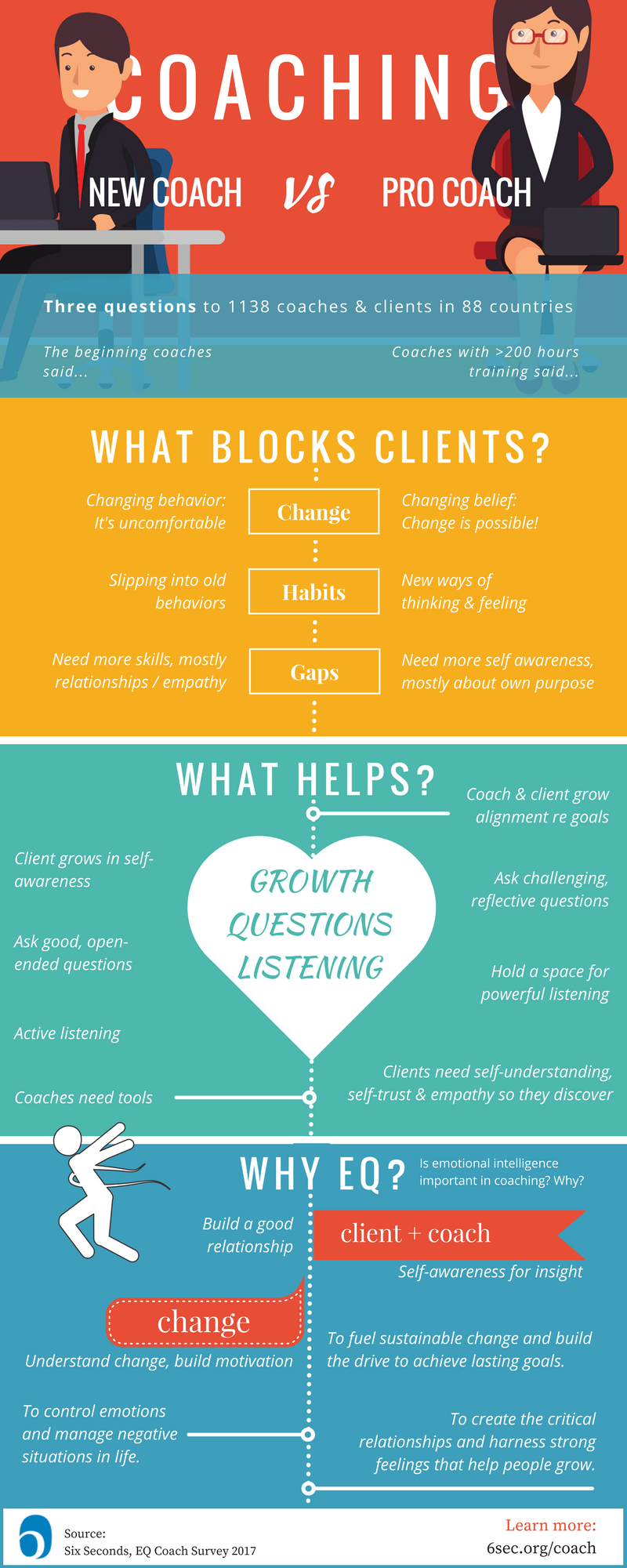What makes coaching so effective, and does emotional intelligence help? How? Here’s an infographic, report, and insights from 1138 professionals — business coach, life coach — and coaching clients from 88 countries.
by Joshua Freedman, MCC, and Marilynn Jorgensen, PCC
What are the most powerful methods for coaching? The word cloud above shows key themes, according to the experienced business coaches and life coaches in our survey sample (over 200 hours of coach training). The cloud comes from semantic analysis (Research by Kapiche), where the largest words are the most significant — and the colors represent themes. So power-coaches say…
First (red theme):
Focus on the client, asking challenging, reflective questions to deepen thinking about goals.
Second (orange):
Hold a powerful space for active listening.
Third (yellow):
Work with emotional strengths, build mindfulness, and self-understanding.
As you can see in the infographic, below, the newbie coaches also touched these themes… but the professional business coach and life coach goes deeper. The infographic compares insights from professional (>200 hours training) vs new coaches on three key questions:
What are the obstacles that make it hard for clients to change?
What coaching methods are most effective for clients to work through these issues?
If emotional intelligence is helpful, why?
DOWNLOAD THE FULL REPORT
The full report includes the infographic, specifics of the different responses by beginner/expert coaches, and demographics. Just fill in the form and you’ll get the report by email in a few seconds (six, perhaps?):
What’s the role of emotional intelligence in coaching?
We know from extensive research that the learnable, measurable skills of emotional intelligence are important at work, in school, and in life. Coaches and coaching clients agree: Emotional intelligence is invaluable. It’s good for coaching clients, but it’s essential for coaches. The question, “How important is it for coaches to have strong emotional intelligence to assist clients with the challenges you identified?” scored a massive 98% agreement that it’s essential.
The question to coaching clients, “How important is it for clients to develop strong emotional intelligence to work through the challenges you identified?” scored 90%, or Highly Important.
In what areas do coaches most need to develop?
From the perspective of coaches, the three most important development areas are:
- Developing a powerful coaching relationship
- Developing yourself as coach
- Structuring an effective coaching session
Coaching clients generally agree, but their priorities are slightly different. When asked what coaches most need to develop, clients said:
- Developing yourself as coach
- Structuring an effective coaching session
- Developing a powerful coaching relationship
Whether a business coach, life coach, or a coaching client, respondents gave extremely high ratings to the importance of coach self-development. This item scored 98% on the 5-point scale, indicating it’s an essential ingredient.
DOWNLOAD THE FULL REPORT
The full report includes the infographic, specifics of the different responses by beginner/expert coaches, and demographics. Just fill in the form and you’ll get the report by email in a few seconds (six, perhaps?):
Assessments in Coaching
Since Six Seconds publishes a range of powerful emotional intelligence assessments and people-metrics tools that are widely used in coaching, we asked the coaches about measurement. Most, 62%, use some assessments. Of these,
32% are EQ assessments (primarily SEI)
26% are personality tools (such as DISC, MBTI or 16PF)
8 % focus on strengths tools (e.g., VIA Character Strengths or Gallup Strengths Finder)
34% use a wide range of other tools including self-developed surveys.
Of interest to those using Six Seconds’ tools, the large majority (around 80%) use only Six Seconds assessments (SEI, Six Seconds Emotional Intelligence Assessments and VS, Vital Signs People-Metrics tools). In contrast, 69% of respondents using emotional intelligence tests published by others are also using additional assessments.
We also looked at the respondents who focus on Six Seconds’ assessments. Among these, the importance of emotional intelligence scored 99%, and the importance of developing self-as-coach 97%. These incredibly high scores demonstrate that these Six Seconds coaches are highly focused on EQ, and our principle that positive change starts from the inside.
DOWNLOAD THE FULL REPORT
The full report includes the infographic, specifics of the different responses by beginner/expert coaches, and demographics. Just fill in the form and you’ll get the report by email in a few seconds (six, perhaps?):
The Depth of Professional Coaches
The infographic below highlights three key questions, comparing the answers from highly trained coaches (over 200 hours on average; many have over 400 hours of training) vs those who are earlier in their professional development as coaches. The answers follow very similar themes, but the coaches with deeper expertise look deeper. For example, the newer coach answers often focus on behaviors where the seasoned coaches focus on the feelings and thoughts that drive behaviors.
DOWNLOAD THE FULL REPORT
The full report includes the infographic, specifics of the different responses by beginner/expert coaches, and demographics. Just fill in the form and you’ll get the report by email in a few seconds (six, perhaps?):
Learn more about coaching:
Overview of coaching with EQ & related articles
EQ Coach Certification training
- How Emotional Intelligence Coaches Use Emotions in Goal Setting - October 2, 2024
- 3 Winning Strategies for Successful Change Leadership: Coaching with Emotional Intelligence - September 4, 2024
- 3 Emotional Intelligence Tips for the Essence of Coaching - July 31, 2024



Men and Women who are deeply committed to their own personal transformation, who want nurturing relationships, who want to create joy and meaning in their chosen work, and who want to be their most powerful, creative and authentic Self. Additionally, these clients frequently have some level of intention to contribute to others, to make a difference in the lives of others
Yes, agreed! I am so thankful to you for this great read. I always wondered about the use of life coaching.
Agree Josh. The ahaa moment when I use in Life Coaching all the competencies of KCG help me a lot to engage in conversation..
EQ is in today…that’s why I want to know more about it!
Emotional Intelligence is a pasport for success in life, whatever field you are in
Great..
Need more knowledge about EQ
Thanks Ruby – you are in the right place for more knowledge about EQ! Here’s a starting point: http://www.6seconds.org/emotional-intelligence 🙂
In addition to being a terrific launching pad for the coach/client relationship, the Six Seconds assessments add so much depth to the coaching conversation. They spark self-awareness, change, and help the client gain clarity around their purpose. I am always amazed at what new insights my clients gain from the debrief session and coaching sessions to follow. I highly recommend the Six Seconds emotional intelligence tools for coaches, no matter what your niche is!
Thank you for this! What an awesome summary of the powerful coaching alliance with a client. I’ve used EI in coaching for years. It is “Empowerful!”
Thank you Anita! We agree!
I agree wholeheartedly that the SEI assessment adds enormous value to a coaching engagement. Helping my clients be more aware and intentional in their choices, has allowed me to open up such rich dialogues with them! Feeling very empowered with EQ! Thank you to Jayne Morrison, my trainer and the Six Seconds team 🙂
Thank you, Aparna, your comments are spot on. The SEI enables us to support others to gain insight, deepen connection (with self and others) and find purpose. Wishing you many rich dialogues ahead 🙂